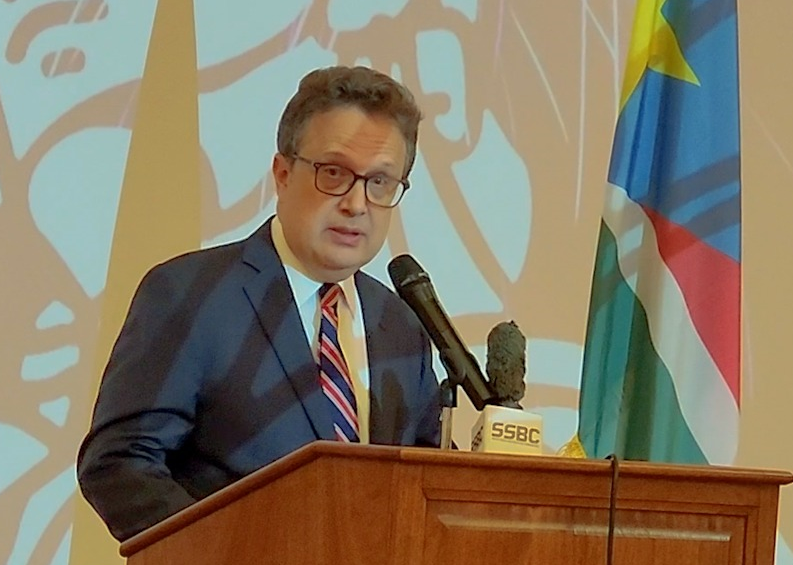You are here: Home | Economy | Humanitarian | News | U.S. ambassador warns South Sudan against donor dependence

The US Ambassador to South Sudan Michael J. Adler - Eye Radio/ Stephen Omiri
The United States Ambassador in Juba on Tuesday cautioned the South Sudan government against donor dependence while appealing for institutional reforms and a conducive environment for investment and development assistance.
Michael J. Adler spoke at a meeting between the Principals of Rome-based Agencies of the United Nations and the International Community in Juba on Tuesday.
Ambassador Adler acknowledged that decades of civil war in South Sudan have resulted in institutional challenges.
But the U.S. diplomat noted that the driving factors behind the dire humanitarian situation in South Sudan, are in the hand of the government to address.
“Mention could be made of a range of factors that lead to increased need including the returnee and refugee flows from Sudan, as well as climate shocks,” Mr Adler said.
“However, the driving factors are those that are in the hands of the transitional government to address. These include corruption and the lack of transitional government use of public revenue to respond to humanitarian needs.”
“These factors also include subnational violence, lack of accountability for human rights violations – including gender-based violence – and failure to meet commitments made in the 2018 peace agreement.”
He said the fundamental problem in the context of South Sudan is not institutional weakness, but mismanagement of public revenue, and corruption, which according to him, has harmed public and private sector investment.
Mr. Adler warned the UN officials and the International Community, that governance challenges cannot be solved through donor assistance directly to state institutions, saying the practice worsens corruption and mismanagement.
“Speaking hypothetically and from a global perspective, we can say that direct assistance to governments may help address weak institutions. However, in this context, we can say with far greater confidence that direct assistance worsens corruption and mismanagement.”
“In the South Sudan context, it is misleading to frame the challenge facing us purely in terms of a peace-humanitarian-development nexus. To do otherwise is to pursue a recipe for continued dependency and weakening of the prospects for the future we all wish for the South Sudanese people: a future of peace, democracy, and prosperity.”
“I need to be clear. Under current conditions, governance challenges in South Sudan will not be solved through donor assistance directly to state institutions.”, he said.
The U.S. official also urged the UN and the international community to “safeguard donors’ investments in humanitarian and development assistance against diversion and elite capture.”
“Just as the transitional government must be accountable to the South Sudanese people, we donors must hold ourselves accountable to our taxpayers back home, and we must consider people in dire need in other countries for whom adequate resources are not available.”
“We must work together to increase efforts to reduce the risks of fraud, waste, and abuse especially when we see extensive illegal networks of road and riverine checkpoints, looting of warehouses, and attacks on humanitarian convoys.”
Ambassador Adler further said the government in Juba must meet its peace commitment and sovereign obligation to take responsibility for its own people by using public revenue to respond to humanitarian needs.
“The transitional government has a responsibility to provide basic services to its citizens. This includes consistent and timely payment of employees in the public sector, such as health workers, teachers, and security forces, in a transparent and accountable manner,” Adler said.
The diplomat also appealed for an increased government contribution to the health sector beyond the current level of two percent, as well as increased contribution to humanitarian response.
Mr. Adler also told the diplomats and UN officials, that this is not the most conducive time for South Sudan to shift away from humanitarian assistance to traditional development assistance.
“It is incumbent upon the transitional government to first create an environment that is conducive to development assistance and investment for this shift to take place so that donors and investors can more effectively help the South Sudanese people.”
“Regrettably, such an environment does not yet exist. It will not exist until the transitional government takes steps to meet peace commitments, address human rights violations and corruption, and establish transparency in the use of public revenue including from the oil sector, which accounts for the vast majority of national resources.”
The United States is the largest international donor of humanitarian assistance to South Sudan – and has provided over 1 billion U.S. dollars in relief package in 2022 alone.
Support Eye Radio, the first independent radio broadcaster of news, information & entertainment in South Sudan.
Make a monthly or a one off contribution.
Copyright 2024. All rights reserved. Eye Radio is a product of Eye Media Limited.